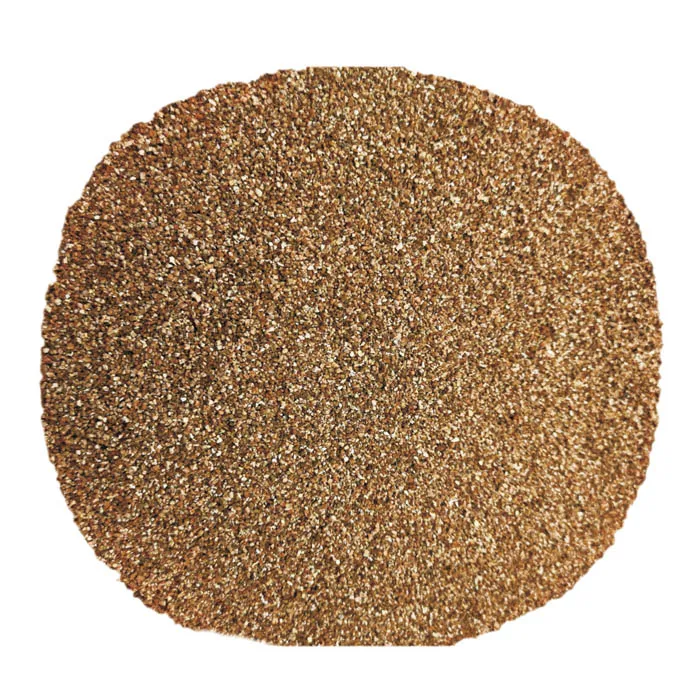Jun . 25, 2025 15:41 Back to list
Optimize Garden Performance with High-Quality Vermiculite Blends
In the world of horticulture and soil science, choosing the right additives can dramatically improve soil structure, moisture retention, and overall plant health. Among these, vermiculite stands out as a leading choice for professionals and home gardeners alike. Known for its lightweight texture, neutral pH, and ability to hold water efficiently, vermiculite plays a vital role in creating an ideal root environment. Whether you're enhancing potting mixes or preparing raised beds, investing in premium vermiculite is a smart move for any grower aiming to boost performance naturally and sustainably.

Home gardeners often start by buying vermiculite to improve water retention in lightweight soil mixes
One of the first steps for many beginners and professionals alike is buying vermiculite to enhance the balance between aeration and water retention in soil. Unlike sand or gravel, vermiculite doesn’t compact and maintains structure even under heavy watering. This makes it ideal for seedlings, container gardens, and hydroponic setups. In regions with fast-draining soil, adding vermiculite ensures that roots have prolonged access to moisture and nutrients, resulting in stronger and more resilient plants. It is also non-toxic and safe for edible gardens, offering peace of mind for organic growers.
Experienced growers often seek vermiculite organic alternatives when transitioning to chemical-free farming
As sustainable agriculture practices grow in popularity, more growers turn toward vermiculite organic solutions for chemical-free soil enhancement. Although vermiculite itself is a naturally occurring mineral, sourcing it from suppliers who guarantee purity and eco-friendly mining methods is key. Organic certification can be important for those selling certified produce or aiming to maintain organic status in community or commercial gardens. This type of vermiculite blends well with compost and organic matter, delivering excellent results without compromising on environmentally responsible standards.
One of the most balanced combinations in soil media includes perlite vermiculite for optimal structure
A common question among gardeners is whether to use perlite vermiculite blends or choose one over the other. While perlite offers excellent aeration and drainage, vermiculite holds water and nutrients for longer periods. The best soil mixes often include both, creating a synergy that supports root development, prevents overwatering, and promotes healthier plants. Particularly in propagation trays and seed starting, combining the two leads to higher germination rates and stronger seedling growth. Adjusting the ratio depending on plant type and environmental conditions allows growers to fine-tune performance precisely.
Budget-conscious horticulturists frequently search vermiculite for sale in bulk quantities to reduce costs
For larger operations or frequent users, sourcing vermiculite for sale in bulk can be a practical and economical solution. From nurseries and landscaping businesses to schools and research centers, many institutions benefit from purchasing wholesale vermiculite to meet their seasonal or year-round soil amendment needs. Bulk vermiculite is often available in various grades, from fine to coarse, each suitable for different applications such as propagation, hydroponics, or transplanting. Choosing the right grade ensures maximum efficiency and minimizes waste in your growing system.
A historic example in the vermiculite industry includes zonolite vermiculite, once widely used before modern standards evolved
Many discussions around vermiculite lead to mentions of zonolite vermiculite, which was a popular brand in the mid-20th century used in insulation and some horticultural products. However, historical concerns around contamination prompted significant industry reform, leading to stricter mining and processing protocols. Today’s vermiculite products are rigorously tested for safety, with most horticultural-grade materials certified asbestos-free and safe for consumer use. Understanding this history allows users to make informed decisions and reinforces the importance of transparency in sourcing.
What Makes Vermiculite Essential for Seed Starting Mixes?
Vermiculite offers superior moisture retention, helping seeds stay consistently moist without becoming waterlogged. This creates ideal conditions for germination and root establishment, reducing transplant shock and improving early-stage plant health.
How Does Vermiculite Compare to Peat Moss in Soil Conditioning?
While peat moss improves soil texture and acidity, vermiculite focuses on retaining water and nutrients. They are often used together, with vermiculite offering a more sustainable option due to its longer lifespan and neutral pH.
Is It Safe to Use Vermiculite Around Edible Plants?
Yes, modern horticultural vermiculite is non-toxic, sterile, and safe for food production. Just ensure the product is labeled asbestos-free and intended for gardening use to guarantee safety in edible gardens.
Vermiculite Buying and Usage FAQs
Q1: What grade of vermiculite should I choose for container gardening?
A1: Medium to coarse grades are best for container gardening, as they provide a good balance between aeration and moisture retention without compacting.
Q2: Can I use vermiculite organic products in hydroponics?
A2: Absolutely. Organic vermiculite works well in hydroponic systems due to its sterile nature, though you should ensure it does not contain additives that might disrupt nutrient balances.
Q3: Are there differences in quality when I find vermiculite for sale online?
A3: Yes, quality can vary depending on origin, processing, and certification. Always look for horticultural-grade vermiculite from reputable sources with third-party safety testing.
Q4: How do I blend perlite vermiculite for seedlings?
A4: A 1:1 mix is a great starting point. You can adjust based on plant type and watering frequency, adding more perlite for drainage or more vermiculite for water-holding capacity.
Q5: Should I be concerned about zonolite vermiculite in old properties?
A5: Zonolite was historically linked to asbestos contamination. If you're dealing with old insulation, consult professionals for testing and removal. For gardening, modern vermiculite products are safe and certified.
-
Strength with Premium Steel and Calcined Bauxite
NewsJul.28,2025
-
Revolutionize Construction Efficiency with Smart Industrial Materials
NewsJul.28,2025
-
Redefined with High-Grade Iron Powder Solutions
NewsJul.28,2025
-
Metallurgical Efficiency with Innovative Recarburisers and Covering Agents
NewsJul.28,2025
-
Industrial Efficiency Enhanced with High-Performance Recarburizer Solutions
NewsJul.28,2025
-
Boosted by Advanced Iron Powder and Carbon Additive Solutions
NewsJul.28,2025
